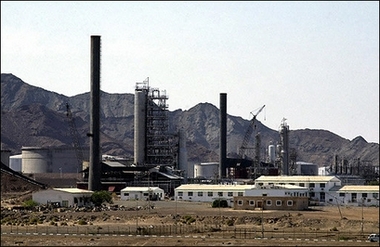Oil prices rise as Iran defies sanctions
(AP)Updated: 2006-12-26 18:54
SINGAPORE - Oil prices rose 1 percent to $63 a barrel on Tuesday after Iran repeated threats that it could use oil exports as a weapon in the wake of UN Security Council sanctions on its trade in nuclear goods.
US light, sweet crude climbed 60 cents to $63.01 a barrel by 0845 GMT in electronic trade. Brent crude jumped 66 cents to $63.08 a barrel.
After months of impasse on Iran's nuclear row with the West, the issue was revived on Saturday after the Security Council agreed to impose sanctions on Iran's trade in nuclear materials and technology, drawing a warning from Tehran.
"If necessary, Iran will use any weapon to defend itself," Oil Minister Kazem Vaziri-Hamaneh was quoted as saying by the semi-official Fars news agency on Tuesday. In the past he has said Iran would prefer not to play the oil card.
Iran, the world's fourth-largest crude producer, has condemned the resolution as illegal and on Sunday vowed to speed up enrichment work, which could heighten tensions.
"Give up this muppet show. You cannot send secret friendly messages to us and at the same time show your teeth and claws," Iranian President Mahmoud Ahmadinejad was quoted as saying by the semi-official Fars news agency.
Oil prices rose earlier in the year on fears that Iran might cut its own oil exports or disrupt Gulf shipping as its row with the West escalated. The issue had faded since summer as the UN appeared unable to agree how to deal with Tehran.
Some analysts said traders might shrug off the news unless they see more definitive signs of a supply disruption.
"It is certainly a bullish factor, but I think geopolitical matters will be ignored unless clearer risks materialize," said Makoto Takeda, energy analyst at Bansei Securities Co.
Prices fell by just over $1 last week, retreating from Wednesday's $64.15 peak as traders bet unusually warm weather in the US Northeast would reduce oil demand.
DTN Meteorlogix said on Monday that temperatures in the US Northeast had averaged 10-16 degrees Fahrenheit (5-8C) above normal over the long weekend. But conditions are set to grow chillier toward week's end, nearing normal by Saturday.
OPEC CUTS
OPEC news lent some support as Abu Dhabi's state oil firm, the main producer in the United Arab Emirates, said it would cut exports of nearly half its crude grades by 3-5 percent in February, the first sign of an OPEC member making good on a second round of output curbs agreed this month.
The new 500,000 bpd cuts are due to take effect in February, giving the cartel time to assess whether peak winter demand will be strong enough to reduce swollen consumer inventories.
Violence in OPEC member Nigeria has also kept oil prices supported.
On Saturday a car bomb exploded outside the headquarters of the Rivers Stats government in Port Harcourt, but no one was killed. The MEND group, which has also targeted oil installations and workers, claimed responsibility.
Given growing geopolitical risks and the start of a new year, some analysts were bracing for a possible fresh wave of index-based investors that could push prices higher.
"We expect another influx of financial money into oil in the coming weeks, and geopolitical threats, such as Iran and Nigeria, remain active," said Mike Wittner, head of energy market research at Calyon Corporate and Investment Bank.
|
||
|
||
|
|


